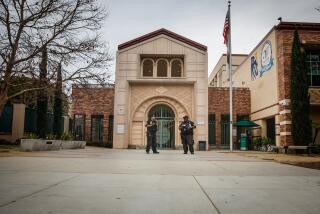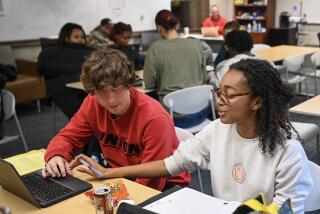Student Cheating Affects Us All
- Share via
A distressing recent news report revealed that 68% of college students have engaged in one form or another of serious cheating. It’s a story that shouldn’t be treated lightly. In the results of the anonymous survey, the category of “serious cheating” included such offenses as plagiarizing passages, turning in someone else’s work as your own, helping someone else cheat on a test, copying another’s work or using a cheat sheet on exams.
It’s been a while since I attended school and I can appreciate that it’s probably harder than ever to earn good grades and to get into postgraduate programs such as medicine, engineering and law, but 68% is a shocking number. It begs the question of whether these are really the types of future adults we want reviewing our medical charts, building our bridges or giving advice on our legal cases.
The problem isn’t limited to higher education, as another survey taken by Who’s Who Among American High School Students revealed that a whopping 80% of seniors admitted to cheating. Flipped the other way, that means that only two out of every 10 high schoolers aren’t cheating.
If I was a late-night comedian, I’d ruefully joke that all the students polled probably also resorted to copying each other’s surveys, but I don’t find moral and ethical lapses of such epidemic proportions particularly funny. It’s one thing to read about Washington politicians lying under oath and millionaire athletes taking banned, performance-enhancing drugs. It’s something else altogether to realize that the vast majority of our young people apparently see nothing wrong with lying and cheating.
Perhaps the most depressing numbers reported in the collegiate study were that while nearly 88% of faculty members admitted that they observed some form of cheating in their classrooms, 32% never did anything about it because of administrative hassles and the fear of being sued by the accused student. In other words, not only are school instructors and administrators aware of the problem, they’re willing to tolerate it.
Where does that leave those students with integrity who do follow the rules and adhere to a code of ethics that not too long ago was commonplace? What are they to think when they discover that not only have they been competing on an uneven playing field, but there’s little or nothing in place to penalize the offenders? My biggest fear is that they’ll simply throw up their hands in frustration and also cross the line.
I’m sure theories abound as to how cheating has become so widespread: Society’s drifting away from traditional religious foundations, the breakdown of the family unit, a corrosion of our communities, the examples set by public figures, etc. I’ve got another hypothesis. Perhaps in our haste to keep up with technology and our willingness to live in an increasingly depersonalized world dictated by the pace of high-speed modems, we’ve become too preoccupied and shortsighted to pass along such fundamental values as honesty, hard work and accountability. In our eagerness to embrace the future, we’re overlooking principles that used to be handed down from generation to generation during far less frenetic times.
Make no mistake about it: This type of lax morality affects us all. Am I the only one, for example, who sees a disturbing parallel between these reports on cheating and the unscrupulous revelations that are currently rocking the LAPD? And what about similarities to the Alaska Airlines tragedy, where allegations persist that falsified maintenance records may have contributed to the accident?
Given the number of students actively involved in such unethical behavior, this cheating problem isn’t something that popped up overnight, and it won’t be one we can anticipate seeing cleaned up in the near future. It’s definitely time to take a good, hard look at the direction we’re going and to try to implement changes that will ultimately benefit all of us.






